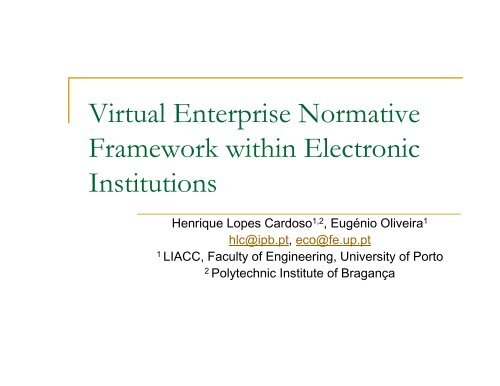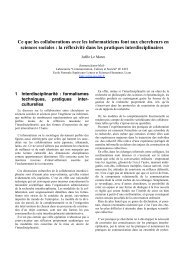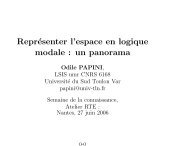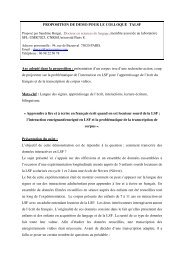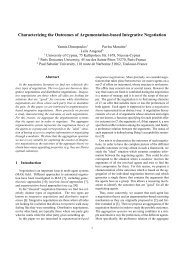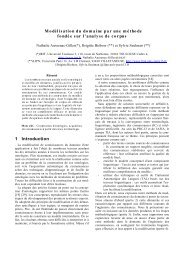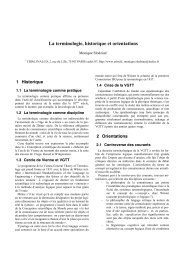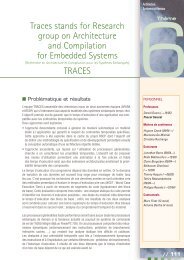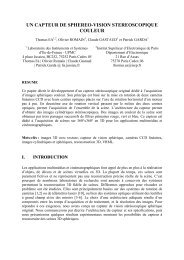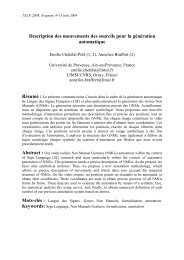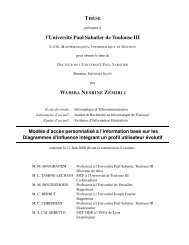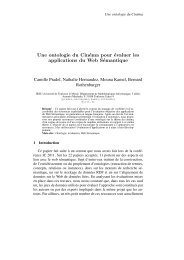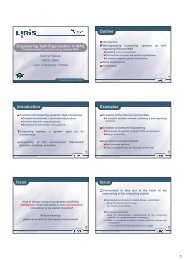Virtual Enterprise Normative Framework within Electronic ... - IRIT
Virtual Enterprise Normative Framework within Electronic ... - IRIT
Virtual Enterprise Normative Framework within Electronic ... - IRIT
You also want an ePaper? Increase the reach of your titles
YUMPU automatically turns print PDFs into web optimized ePapers that Google loves.
<strong>Virtual</strong> <strong>Enterprise</strong> <strong>Normative</strong><br />
<strong>Framework</strong> <strong>within</strong> <strong>Electronic</strong><br />
Institutions<br />
Henrique Lopes Cardoso 1,2 , Eugénio Oliveira 1<br />
hlc@ipb.pt, eco@fe.up.pt<br />
1<br />
LIACC, Faculty of Engineering, University of Porto<br />
2<br />
Polytechnic Institute of Bragança
Outline<br />
<br />
<br />
<br />
<br />
<br />
<br />
<br />
<br />
VO/VE and MAS<br />
<strong>Electronic</strong> Institutions<br />
E-contracting and VE contracts<br />
<strong>Normative</strong> <strong>Framework</strong><br />
VE Contract specification<br />
Current work<br />
Agent society perspective<br />
Open issues<br />
ESAW'04 2
<strong>Virtual</strong> Organizations/<strong>Enterprise</strong>s<br />
<br />
VO/VE concept<br />
<br />
Applied to many forms of cooperative business relations, like outsourcing,<br />
supply chains, or temporary consortiums<br />
<br />
Definition<br />
<br />
“a temporary consortium of autonomous, diverse and possibly geographically<br />
dispersed organizations that pool their resources to meet short-term objectives and<br />
exploit fast-changing market trends” [Davulcu et al., 1999]<br />
<br />
Consortium contract [Portuguese legislation]<br />
entities coordinate their efforts towards accomplishing some activity<br />
consortium types:<br />
<br />
<br />
External: new entity represents joint activity to third parties<br />
Internal: consortium’s goal does not include supply of goods to third parties<br />
(although the members’ goals might)<br />
ESAW'04 3
VE Lifecycle<br />
Business definition<br />
client need; market opportunity<br />
Formation<br />
goal definition; selection of<br />
participants through negotiation;<br />
roles and obligations<br />
Operation<br />
business development<br />
Regulation<br />
adjustments in consortium structure<br />
(exit/entrance of partners)<br />
Dissolution<br />
goals accomplished; VE no longer<br />
justified<br />
ESAW'04 4
MAS and VO/VE<br />
<br />
Autonomous agents as enterprises:<br />
<br />
<br />
<br />
represent individual interests of an enterprise<br />
negotiate in order to constitute a VO<br />
cooperate by coordinating their activities, fulfilling the VO purpose<br />
<br />
<strong>Normative</strong> perspective<br />
<br />
agents are heterogeneous, independently developed and privately<br />
owned<br />
<br />
Need for normative systems that enable trust<br />
<br />
<br />
agents follow norms or suffer consequences<br />
agents commit to cooperative agreements (business norms<br />
regulating the consortium activity)<br />
ESAW'04 5
<strong>Electronic</strong> Institutions<br />
<br />
EI as an agent interaction framework<br />
regulations<br />
trustable environment<br />
<br />
EI regulations<br />
Identity of members<br />
<br />
<br />
<br />
<br />
<br />
registration, digital signatures<br />
Shared ontology specifications<br />
<br />
domain-independent business terms and domain-specific vocabulary<br />
Business norms<br />
<br />
applicable to any business engagement<br />
Negotiation protocols<br />
<br />
for negotiating contract clauses, possibly requiring mediation<br />
Contract specification<br />
<br />
formal contractual requirements (representation, signatures, …)<br />
ESAW'04 6
<strong>Electronic</strong> Institutions’ Services<br />
<strong>Electronic</strong> Institution<br />
Members<br />
Negotiation<br />
Protocols<br />
Contract<br />
templates<br />
Ontologies<br />
Business<br />
norms<br />
Contract<br />
registry<br />
Transaction<br />
repository<br />
Members’<br />
reputation<br />
Registration<br />
Brokering<br />
Negotiation<br />
mediation<br />
Contract validation /<br />
registration (notary)<br />
Contract monitoring<br />
and enforcement<br />
Reputation<br />
ESAW'04 7
E-contracting<br />
<br />
<br />
<br />
Definition<br />
a contract is a formalization of the behaviour of a group of agents that jointly<br />
agree on a specific business activity<br />
E-contracts and norms<br />
contracts form a normative structure<br />
by contracting, agents commit to norms<br />
E-contract handling and institutional services<br />
Information discovery (pre-contractual phase)<br />
<br />
<br />
<br />
brokering (yellow pages)<br />
Contract negotiation (contractual phase)<br />
<br />
templates; negotiation mediation; contract validation and registry (notary)<br />
Execution (post-contractual phase)<br />
<br />
contract monitoring and enforcement; transaction repository; reputation services<br />
ESAW'04 8
E-contract specification<br />
<br />
Usual approach<br />
<strong>Normative</strong> concepts (from deontic logic): obligation, permission,<br />
prohibition<br />
<br />
+ sanction: making obligations (or prohibitions) effective<br />
<strong>Normative</strong> statement [Sallé, 2002]<br />
ns: ϕ θ s,b<br />
(α < ψ)<br />
<br />
appropriate for simple contracts (e.g. purchase):<br />
<br />
<br />
<br />
<br />
ns1: O se,bu (deliver(product, quantity) < date(delivery_date))<br />
ns2: fulfilled(ns1) O bu,se (pay(price) < date(delivery_date+30))<br />
ns3: not_fulfilled(ns1) O se,bu (give_discount(-10%, price))<br />
ns4: not_fulfilled(ns2) O bu,se (pay(+5%, price) < date(delivery_date+60))<br />
⇒ What about complex (VE) contracts?<br />
ESAW'04 9
VE Contracts<br />
<br />
VE business relationship is more complex in nature than a simple<br />
sell/purchase operation<br />
<br />
<br />
<br />
<br />
<br />
<br />
ongoing (although limited) relationship between partners<br />
cyclical interactions<br />
deliberate contract termination<br />
exit/entrance of partners during the VE lifecycle<br />
establishment of contracts with third-parties<br />
profit exchange<br />
<br />
A two-level conception of VE contracts<br />
VE constitution vs. operation<br />
<br />
<br />
Constitutional contract establishes a cooperation agreement<br />
Operational contracts implement the intended cooperation<br />
ESAW'04 10
<strong>Normative</strong> <strong>Framework</strong><br />
Institutional norms (the law)<br />
<strong>Virtual</strong> <strong>Enterprise</strong> constitution<br />
(cooperation agreement)<br />
framework against which a VE<br />
contract can be validated<br />
platform<br />
Operational<br />
of cooperation <strong>within</strong> which<br />
contract<br />
operational contracts between VE<br />
participants (executable can be norms)<br />
checked<br />
actual exchanges of products/services,<br />
which can be monitored<br />
Contract<br />
monitoring /<br />
enforcement<br />
Contract validation<br />
ESAW'04 11
VE Contract specification<br />
<br />
Focusing on the cooperation commitment:<br />
VEContract = <br />
<br />
Header (H): contract id, normative system, organization participants,<br />
resources to be exchanged, signing date, digital signatures<br />
H = <br />
Partics = {Partic i }<br />
Ress = {Res k }<br />
Signs = {Sign i }<br />
<br />
Cooperation effort (CoopEff): workload acceptance levels and associated<br />
prices<br />
CoopEff = {}<br />
Wload = <br />
Freq ∈ {per_day, per_week, per_month, per_year}<br />
ESAW'04 12
VE Contract specification (2)<br />
<br />
Business process (BP): flow of resources between participants<br />
BP = <br />
<br />
Request permits (ReqPerm): allowed requests that parties may perform towards<br />
their partners<br />
ReqPerm = <br />
Who, Whom ∈ Partics; What ∈ Ress; ∈ CoopEff<br />
<br />
Obligation chains (OblChain): implement the business transaction steps composing<br />
the required workflow<br />
activated by the enactment of request permits<br />
can be regarded as templates for operational contracts (executable norms)<br />
OblChain = <br />
OblRule = <br />
ESAW'04 13
Current work<br />
<br />
<br />
Declarative representation for<br />
<br />
<br />
<br />
institutional norms<br />
VE constitutional and operational contracts<br />
enabling<br />
<br />
<br />
<br />
validation of contracts according to the normative framework<br />
monitoring and enforcement of operational contracts<br />
regulation of the VE lifecycle<br />
Integrate institutional services<br />
focus on contract handling<br />
<br />
<br />
contract creation<br />
templates<br />
negotiation mediation<br />
contract validation<br />
contract monitoring/enforcement<br />
transaction registration<br />
sanction imposition<br />
reputation mechanisms<br />
ESAW'04 14
Agent society perspective<br />
<br />
<strong>Normative</strong> framework for self-interested agents in<br />
cooperative scenarios<br />
<br />
Agent interaction regulated by institutions<br />
EI provides a trustable environment by imposing and<br />
enforcing norms<br />
<br />
Agent cooperation agreements impose further norms<br />
agents voluntarily commit to norms because organized<br />
cooperation is in their interest<br />
<br />
Agent operational contracts enact cooperation<br />
by fulfilling executable norms agents carry out their<br />
cooperation agreements<br />
ESAW'04 15
Open issues<br />
<br />
Relational contracting<br />
<br />
<br />
formal contract: fully specified enforceable contract based on a third<br />
party (EI)<br />
relational contract: self-enforceable, based on the value of future<br />
relationships<br />
<br />
(How) can agents learn the level of detail for their contracts<br />
according to past experience and agents’ reputations?<br />
<br />
(How) can the EI impose certain specifications to non-fulfilling<br />
agents?<br />
<br />
Norm evolution<br />
Can new institutional norms emerge from the continuous<br />
operation of the EI?<br />
ESAW'04 16


